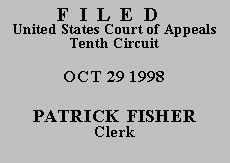

| DELMAR WAITS,
Plaintiff-Appellant, v. WILLIAM (BILL) HARTLESS; SUSAN ALLEN; C. MOSCHETTI; D. CHUMBLEY; J. GAUNT; D. COX; JANE KENNEDY; SHELLY ROBINSON, Defendants-Appellees. |
|
Before SEYMOUR, BRORBY, and BRISCOE,
Circuit Judges.
After examining the briefs and appellate record, this panel has determined
unanimously that oral argument would not materially assist the determination of
this appeal. See Fed. R. App. P. 34(a); 10th Cir. R. 34.1.9. The case is therefore
ordered submitted without oral argument.
Mr. Waits is a state inmate and now appears pro se appealing the dismissal of his 42 U.S.C. § 1983 civil rights action.
The Record on Appeal
Mr. Waits is confined in a Colorado State penitentiary. He commenced this action by filing his complaint June 19, 1995, claiming various defendants (employees of the State of Colorado) over a period of fourteen months exposed him to second-hand smoke by smoking in both his working and living areas. He further alleged the smoking occurred in violation of an executive order issued by the Governor of Colorado. He alleged "[t]he medically documented sinus problems of the Plaintiff were further aggravated so that he was forced to get the sinus medication."
Mr. Waits' claim survived summary judgment and went to trial. At the commencement of trial, the parties submitted exhibits and made opening statements.(1)
The district court then ruled Defendants were entitled to qualified immunity and dismissed the case. The transcript reveals the following statement by the district court:
Court rules that Governor Roy Romer's Executive Order at the time it was issued with regard to prohibiting smoking in State Institutions is not a Scientifically Proven Order; therefore, defendants were not deliberate or intentional in their actions and it is ORDERED that plaintiff cannot recover in this case.
Court ORDERS that this case is dismissed without costs to be awarded.
Thereafter, the district court entered an order, stating in part: "The Court rules as a matter of law that defendants' actions were not deliberate or intentional and it is ORDERED that plaintiff's complaint is DISMISSED based upon the doctrine of qualified immunity."
Unfortunately, the above represents the entire pertinent portion of the record on appeal.
Mr. Waits appeals these rulings, asserting: (1) The district court erred in ruling as a matter of law that Defendant's actions were not deliberate or intentional; (2) the district court erred in dismissing the Plaintiff's complaint based on the doctrine of qualified immunity; and (3) the district court erred in stopping the bench trial prematurely, before any witnesses or evidence were presented.(2) Mr. Waits has also filed a Motion to Dismiss Appellees' Opening Brief on the ground Appellees failed to file their brief within the time frame enumerated in the clerk of court's letter.
Jurisdiction
Appellees first argue we have no jurisdiction to decide this appeal, contending the notice of appeal was not timely filed. Mr. Waits did not reply to this contention. The final judgment in this case was entered February 6, 1998. The notice of appeal was dated and filed by counsel for Mr. Waits on March 11, 1998. This was thirty-three days after the entry of the final judgment. Thereafter, on April 10, 1998, Mr. Waits was granted leave to proceed on appeal by the district court by paying the filing fee in installments.
Rule 4(a)(1) of the Federal Rules of Appellate Procedure provides, in part:
[I]n a civil case in which an appeal is permitted by law as of right from a district court to a court of appeals the notice of appeal ... must be filed with the clerk of the district court within 30 days after the date of entry of the judgment or order appealed from ....
An appellate court acquires jurisdiction over an appeal from a district court decision only upon the timely filing of a notice of appeal. See Smith v. Barry, 502 U.S. 244, 244 (1992). Once an appellate court determines a notice of appeal is untimely, it is without discretion to review the merits and must dismiss the appeal. See Budinich v. Becton Dickinson & Co., 486 U.S. 196, 203 (1988).
The record on appeal reveals no motions that might have extended the time for filing the notice of appeal.
The requirement to file a timely notice of appeal is both mandatory and jurisdictional and is a requirement this court is without power to waive. Consequently, we have no jurisdiction to hear this appeal.
The appeal is DISMISSED.
Entered by the Court:
WADE BRORBY
United States Circuit Judge
*. This order and judgment is not binding precedent except under the doctrines of law of the case, res judicata and collateral estoppel. The court generally disfavors the citation of orders and judgments; nevertheless, an order and judgment may be cited under the terms and conditions of 10th Cir. R. 36.3.
1. Mr. Waits was then represented by counsel.
2. Mr. Waits filed with this court a Motion for Appointment of Counsel requesting a "Federal Public Defender" be appointed to represent him. We have previously held the Sixth Amendment right to counsel is explicitly confined to criminal prosecutions, and limited to the risk of loss of liberty. See United States v. Deninno, 103 F.3d 82, 86 (10th Cir. 1996). Even if treated as a request for appointment of counsel under 28 U.S.C. § 1915(e)(1), Mr. Waits' failure to file a timely appeal prevents this court from addressing the merits of such a request.